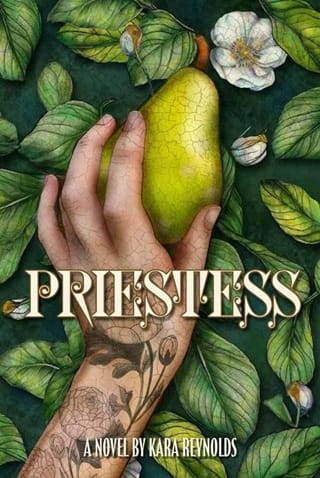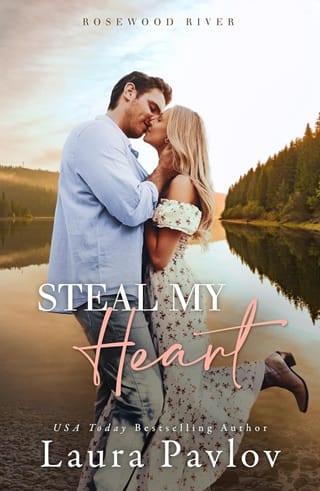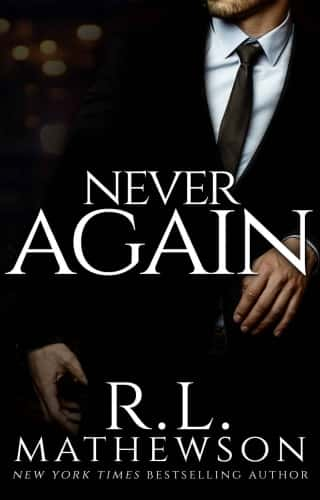70. Knelling
I waited until I was sure he was gone and then, having time before the morning meal, I decided I should wash my hair, which was a mistake.
My hair took a half day to dry out of a braid crown and I had never worn it down at the temple.
I dried it with my linens as much as I could and braided it down one side.
I put on a shift, stays and the teal dress.
I returned to the room to belt on my sagaris and leather apron and joined my friends on their way to the dining hall.
Mischa and Helena had been gracious about my likely being in love and had not brought it up to me since.
But on our way to the dining hall, I grabbed Helena’s hand and held her back.
“Please make sure we sit with our backs to all the army tables.”
Without questioning me, she nodded.
We sat as such and under the conversation of others, she asked, “Are you well?”
“I do not know.”
“Has Alric upset you?”
She pushed a bowl of apples in my direction.
I ignored it.
“Indirectly.”
“Edie, what are things between you?”
I turned to her, our faces close, eyes intent on each other.
“We are as dutiful allies.
But I believe you know to where my heart has run away from me.”
She put her hand over mine on my lap.
“Caleb tells me he thinks Alric—”
“I know,”
I said.
“His body wants after mine.”
Helena nodded.
“Yes, that.
But— I will ask again.
Are you well? If you are not, I wish you would tell me.
Do not try to bear things on your own.”
I stood, smiling.
“I need to see to something early in the temple.”
“Edie, please,”
Helena pressed, her hand holding mine.
I squeezed it and walked away, head turned from the tables for the armies.
Darting down the corridor to the earth temple’s antechamber, I nearly ran into Archpriest Yro.
He stood in front of me, hands out a little, as if he had sensed my clumsy approach, his sightless eyes staring down at me from his bony face.
He wore his pale blue-green robe with its abstract swirls meant to represent zephyrs and whirlwinds.
“The captain’s wife,”
he said.
There was something serpentine in his speech, a hiss or a sibilance that disturbed.
“Cian speaks highly of our Mother’s blessing you.”
“He is too kind,”
I said, unsure of what to do, but wanting to show him respect.
He breathed in and gave me a sad smile.
“The Knelling will come soon, lady.
I am sorry to tell you this.
But you know that your goddess is pleased.
She wishes to resorb your body into her wood.
She yearns for your bones.”
“Into her wood?”
I sounded like a child repeating their parent’s words.
“Ah, you are new to our faith.
I apologize.”
He crossed his stringy arms, the cuffs of the robe falling back to reveal his stick-like wrists.
“Should they wish, her children can be laid to rest in Nyossa.
Her creatures pick the bones clean and they lay on their final bed, her mosses.”
As pleasantly as I could, I said, “That does not sound so bad.”
“It is good that you think this, Madam Angler.
The Knelling will visit you before you have spent a full four seasons here.
May I tell you a story? It came to me in a dream.”
“Please,”
I said, at a loss as to what else to say.
His white eyes were on mine.
“The vole tried to be a bird twice, but she fell from the second nest into the mouth of the fish.
She has no feather or fin.
And soon she be without a paw.”
“Th— Thank you,”
I stuttered.
“Be at peace,”
he said, moving to walk away.
“Your goddess loves you.”
I made my way to the earth temple, desperate for my desk with its piles of tax ledgers and half full pen nibs.
Once there, I sat with my head in my hands.
I was troubled by thoughts of my husband, wondering whether or not the knowledge of him wanting me was good or bad.
And the archpriest of Brother Air had set a cipher before me about my bones being in Nyossa.
What had panicked me about his dream was the use of ‘vole.’ Vole had been my maiden name, me shedding it when I was first married for Thrush and then, in a fit of imbecility, ten winters past, I had become a citizen of Eccleston under the name Finch.
I had only just thought that my first husband would come looking for me and I should no longer carry his name.
And I stupidly picked another bird.
And now my last name was that of a large-mouthed fish.
What had any of that meant? I was unnerved.
“Good morning,”
Hazel said, taking a seat near me at her desk.
Before I lost the courage, I said, “Good morning, Hazel.
May I trouble you with another childlike question about The Farthest Four?”
“You may,”
she said cheerily, her eyes on a handwritten ledger spread before her.
“What is The Knelling?”
She looked up at me, her brows lifted.
“Are you reading a particularly fanciful account of ancient Tintar?”
I went to shake my head, but felt a hesitance to disclose my encounter with Yro. “Yes.”
“It has not been recorded in an age,”
she said, eyes back on her work.
“It is when your god or goddess speaks to you as you approach the end of your life.”
I swallowed.
“Mother Earth has never spoken to you?”
Hazel shook her head.
“Not with words.
But with flowers and harvests and the birth of a foal and my blood renewing the life in a stillborn calf.
With every slice of pear I eat.”
I smiled at her, my turmoil unseen.
“She does sparkle, doesn’t she? All of her.”
“She does,”
Hazel said, looking at me curiously.
“Thank you for all of your guidance these past moons,”
I said, eyes on my desk, vision blurring.
“You have been so accommodating.”
Hazel went on to say many kind things about me.
I pretended to cover my face to blush, but I hid the terror rising in me.
I was going to die and soon.
I prayed in my mind.
We have only just met, goddess.
I have only just begun my service to you.
Why take me now?
But she did not speak to me in return.
 Fullepub
Fullepub 



